Almost There: Marlene Dietrich in "Witness for the Prosecution"
 Monday, July 6, 2020 at 5:44PM
Monday, July 6, 2020 at 5:44PM 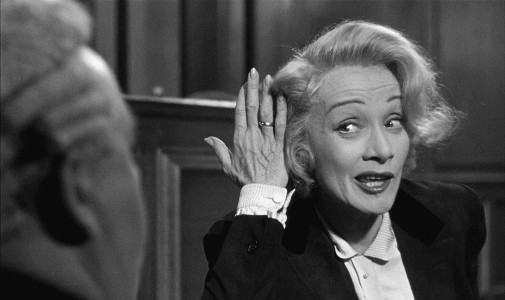
1957 was a fascinating year when it comes to the Oscars' acting categories. Thanks to the stultifying Sayonara, Miyoshi Umeki became the only Asian actress to ever win an Academy Award, while silent era Asian-American sex symbol, Sessue Hayakawa, received his first and only Oscar nomination for The Bridge on the River Kwai. In that same year, the Best Actress race saw Elizabeth Tayor receive her first nomination, and Deborah Kerr coming the closest she ever was to win an Oscar, for Heaven Knows Mr. Alison. She lost, but was, at least, nominated, unlike the cast of Best Picture nominee 12 Angry Men. It seems insane to think so, but none of that picture's astounding performances got any love from AMPAS, not even for Henry Fonda's star turn.
That being said, no snub hurt more than that of an actress so confident she had earned Oscar gold, that there was a prerecorded introduction to her Vegas show that mentioned a 1957 nomination. We're talking about Marlene Dietrich in Billy Wilder's Witness for the Prosecution…
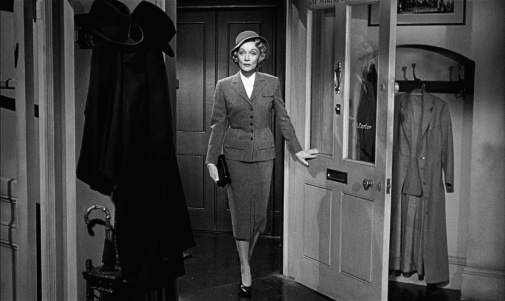
Adapted from a play by Agatha Christie, Witness for the Prosecution is a twisty procedural that focuses on the murder trial of the handsome Leonard Vole. After befriending a rich old widow by the name of Emily French, Mr. Vole became the prime suspect on her murder, having been previously made the biggest beneficiary of her last will. When we first encounter him, he's making his case to Sir Wilfrid Robarts, a respected barrister of great fame and ill health, who's eager to jump back into action after a stint at the hospital. What ensues is a game of deception in and out of court that is only made more perverse and complicated by the presence of Leonard Vole's German wife, Christine.
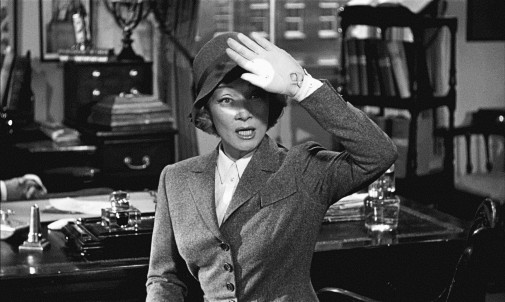
At first, Christine seems to be eager to help her husband, despite the aura of icy mystery that she exudes. Nobody onscreen really trusts her, not even after Leonard tells of their first encounter, a romantic meet-cute in bombed-out Germany that's equal parts romantic comedy and wartime film noir. The suspicions of Sir Wilfrid are only corroborated when Christine appears as a witness, not for the defense, but for the prosecution, contradicting every statement she had first made to her husband's attorney. While one doesn't wish to spoil the 63-year-old mystery, it's very difficult to discuss Dietrich's performance and character without unraveling most of the flick's surprises.
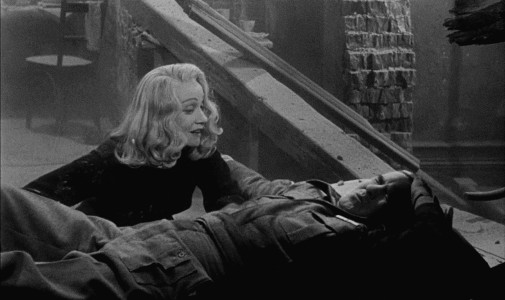
When everything seems lost, Sir Wilfrid receives a promising call from an unknown woman who says she has incriminatory information on Christine. Rejecting the advice of his doctors and nurses, the barrister goes to meet this woman, finding a sullen, rude working-class caricature whose rage against the German seductress makes the screen vibrate in fright. Whatever her reasons may be, the woman's vengeful ploy ends with Sir Wilfrid's acquisition of letters that disprove Christine's testimony for the prosecution and effectively win Vole his freedom. However, before the picture ends, there's a plot twist. The unknown woman was no other than a disguised Christine, who manipulated justice and public perception to save her murderous paramour.
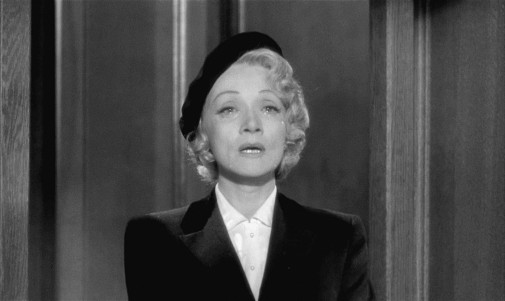
In other words, the role of Christine Vole is performance inside another performance, inside a performance, a Matryoshka of lies and deceit. Only at the end does Dietrich get to show genuine emotion for, until then, she must play a Machiavellian genius pulling the strings, both towards the characters in the story and the audience watching the film. We mustn't trust Christine during any of the early scenes, and, in that regard, Dietrich excels as no other actress could. Leaning on her glamourous, but aloof, screen persona, she conjures a vision of untrustworthiness made flesh, an archetypal femme fatale that's as beautiful as she is poisonous.
It's easy to underappreciate Dietrich's craft since she so often played similar roles and hardly ever challenged the public and the studio's idea of herself. Watching her give life to Christine feels a lot like seeing a consummate professional going through the motions, a well-oiled machine whose precision doesn't surprise. Still, there's intelligence in the actress's choices, like the way she holds her body in rigid poses when on trial. Dietrich calls attention to the performative nature of Christine by contrasting such rigidity, as well as the staccato intensity of her anger, with the body language she exhibits during the amorous flashback and the finale's plot twist.
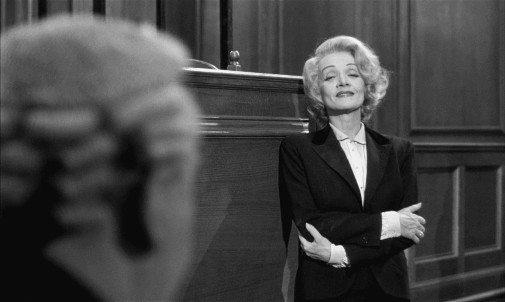
When meeting Leonard in Germany or laughing at Sir Wilfrid's incredulity, Christine shows her true colors and Dietrich's trades in the rigid posture for sensuous confidence that magnetizes the screen with its relaxed power. But even then, there's dishonesty to Dietrich's bravado, sly showmanship to the way she grabs men's attention. That disappears for good when Christine herself is betrayed, her mask of assuredness slipping away and leaving behind the caustic pain of a heartbroken woman. For a second, the actress allows us to see the real person behind these layers of play-acting, but neither she nor her director permits the audience to gawk at Christine's wretched vulnerability. For her final moments on-screen, she faces away from the camera, snubbing it.
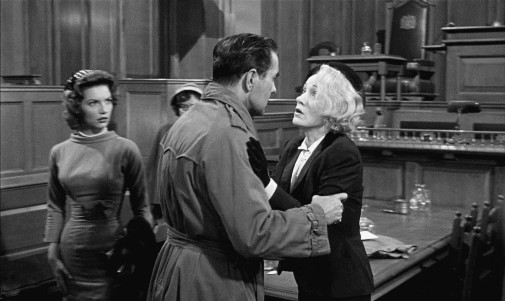
All that, and Dietrich has the scene as the unknown woman, a storm of manic ticks and showy cosmetics that fooled many a spectator back in 1957. To be honest, even when I first watched the movie many years ago, I didn't realize Dietrich was the same woman who gives Wilfrid the incriminating evidence. It's no seamless chameleonic transformation, but a crass explosion of big acting that is so at odds with Dietrich's trademark style that it feels like a different actress altogether. Because of that feat, Dietrich assumed an Oscar nomination was guaranteed. In the end, though, her short screen-time and reputation as a great star rather than a good actress cost Dietrich the Academy's recognition.
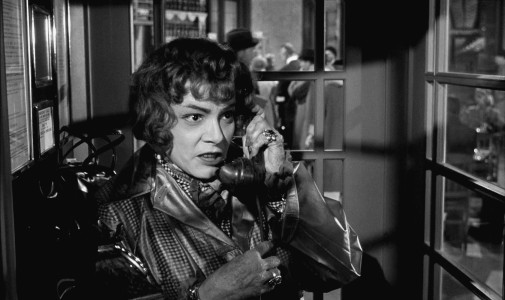
Witness for the Prosecution is available to stream on Amazon Prime Video. You can also rent this classic from Apple iTunes, Google Play, Youtube, and others.



Reader Comments (24)
This is THE performance of 1957. One of the biggest omissions in Oscar history.
Jimmy: If only ONE nomination was possible for Witness for the Prosecution? I think they made the right choice. Who would YOU want to get to two nominations: The Bride of Frankenstein or The Blue Angel?
Elsa Lanchester was great as always, but Marlene was the most outstanding in the picture. Why not nominations for both? Marlene in Leading and Elsa in Supporting.
Marlene Dietrich is really great in this movie, but maybe as a supporting actress she had a chance to win, not as a leading, Woodward is beyond words.
She's a lead.That's the category in which she was nominated for a Golden Globe, and I'm sure she was submitted as such by her studio (back then the studios determined who was lead and supporting to avoid another Barry Fitzgerald situation). She's infinitely better than Liz and Lana, and deserved to replace one of them.
She's the winner in my personal awards by a mile. Fantastic performance in a fantastic film.
Terrific film.
Yes, a great omission. And Tyrone Power too. Like in most Billy Wilder movies, the cast is all a perfection.
I was also fooled by her. I remember rewinding the tape (yes, I saw it in the nineties) just to watch those scenes again. It was electrifying to see and the movie could only work if she could pull it off. And pull if off she did.
Wonderful overview of a great performance. I didn't realize it was she as the harridan the first time I saw the film either. That knowledge doesn't spoil repeat viewings though, of which I've done many.
Perhaps the category confusion is what cost her the nomination but she's a supporting player, albeit a major one, to Laughton as is the rest of the cast.
I love Elsa Lanchester always and I love her in this but if anyone deserved a nomination it was Marlene. Had she been nominated here, especially against this less than amazing field she could have walked off with the prize without a doubt.
If she refused to be entered as supporting it's a shame since her film career was all but over by this point, she only made four more films one of which was only a cameo, but then someone with the strong sense of self and mystique that Dietrich possessed and exuded would only ever see herself as a Star whether she was in a supporting role or not.
Be that as it may she's my choice for the best supporting actress of '57 by many, many miles.
Love this film. And this is the performance that sticks the most -- not because her fellow actors were bad or mediocre, but because she's that good.
loved loved loved this performance. Loved the whole movie actually but Dietrich... WOW. and just keeps getting more amazing as the film progresses.
The BEST Hitchcock film, not directed by Hitchcock. I love this one, and of course, Marlene steals the whole show, along with Laughton.
Just had to check out the line up for that year and... wow. 2 italian actors, 2 japanese actors, The Bridge over River Kwai! That year was way more diverse than any given recent year! Vittorio de Sica, nominated as actor! Magnani! Elsa Lanchester! Still, unforgivable to let Dietrich out (probably she deserved to go as lead, and maybe that was the mistake, as in Supporting she would have probably won the nom over Lanchester).
Still, Marlene, as Marilyn are SO OVER Oscars, that they never needed to win one, to become two of the most iconic and best actresses to ever grace a cinema screen.
I agree that Marlene didn’t need it, still the Academy was quite harsh with her. Perhaps I’m partial (even her cameo in Touch of Evil is awards worthy for me) but her nom for Morocco could easily become a victory and her works in Shanghai Express, Blonde Venus, Witness and (as supporting) in Judgement could be nominated without problems.
Yep, today she would have been campaigned as Supporting but back then things went differently
I thought the reason Marlene didn't get a nomination was because the votes were split between Lead and Supporting. I read somewhere that Marlene insisted on being considered as a Lead while the studios pushed her for Supporting.
At the very least she should have been nominated for Supporting and Henry Fonda should have been nominated for 12 Angry Men.
Two great films.
Yeah-she easily is the BSA of 1957. But, back in the day, ‘big stars’ were deemed too important to be regulated to the ‘B list’ Supporting category. That box seemed reserved for newcomers and character actors-not big box office names.
She's better than all five of that year's Best Actress nominees.
Marlene Dietrich is the star of Witness for The Prosecution. She can't go supporting at all. 😡
A terrific defense. I'm not convinced, though. It doesn't help that WFTP was creaky as hell even in 1957; the damn film stops for 456 minutes so Charles Laughton could play with his staircase lift! Eveyone except Lancaster overacts, especially Tyrone Power. Watching Dietrich in this movie reminds me of her unconventionality: she's not a typical actress and best used to project irony and coquettishness.
Poor Deborah Kerr. Is Heaven Knows Mr. Alison her closest bid? I know it would have been between her and Joanne Woodward, but like losing against fresh to leading roles Hepburn in Roman Holiday, wasn't Woodward's performance the sort that felt undeniable? I feel like Ingrid Bergman winning her second for Anastasia over iconic Kerr in The King And I was probably by the narrower voting margin, despite Ingrid's story and beloved Academy status.
Also on Deborah she lost to Actresses who the Academy gave 5, 5, 7, 4, 5 and 5 career nominations to respectively. Two of which won twice and one of which won three times! She really had tough luck.
Onto Marlene, she was going for Lead and to be honest, It's a lineup she possibly could have cracked.
I did once read that her failure to get a nomination was partly because the studio didn't want to publicise her dual roles and give away the big twist (as happened years later with Jaye Davidson in the Crying Game).
She IS the Witness for the Prosecution. The titular role.
Kristin Scott Thomas should play Dietrich in a biopic about this part of her life.
I'd swop out Lana's nom (she shld've been nom for The Bad & the Beautiful or Imitation of Life!!), but I'm torn between putting Marlene or Masina (Nights of Cabiria) in the final spot.
I'd go w the latter as Cabiria is such an iconic role n Masina has nvr been more charming n heart breaking ♥